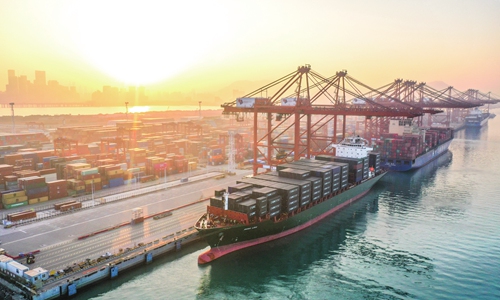
A freighter full of containers prepares to leave the port at the Dachanwan port container terminal in Shenzhen, South China’s Guangdong Province, on January 21, 2022. Photo: cnsphoto
In a piece for US magazine Foreign Policy published on Sunday, Jonathan Tepperman, former editor in chief of the magazine, did not mince words in peddling the "China collapse" cliché. "Far from a rising behemoth… China is teetering on the edge of a cliff," Tepperman argues. He went on to assert that "a weak, stagnant, or collapsing China would be even more dangerous than a thriving one - not just for the country itself, but for the world."
While Tepperman tries to position the article as raising the alarm and making suggestions for Washington to deal with a "collapsing China," the article is nothing more than another hatchet job on China. To put it bluntly, nothing in the article is new or original. The "China collapse" theory has been around for years. And Tepperman did not offer any new information or materials to support that theory.
Despite the alarmist tone of the article, Tepperman only repeated claims widely hyped by Western media outlets about various recent major events in China, including the 20th National Congress of the Communist Party of China (CPC), China's adjustments to its COVID-19 prevention and control measures as well as some challenges facing the Chinese economy. Frankly, for most Chinese, reading such articles is a waste of time, except that they do provide a certain degree of amusement when these Western anti-China forces' wishful thinking about "China collapsing" fails to materialize time and again.
While these malicious claims are not worth responding to each time, they do represent growing danger in relations between China and the West as well as for the world. The dangerous free fall in China-US relations in recent years was caused in no small part by fearmongering about China's rise or "collapse" - whichever suits the narrative and goal of instigating confrontation with China. The intensification of such fearmongering narratives will only further contribute to misunderstanding and miscalculation about China that could lead to disastrous outcomes. Moreover, such narratives provide cover for increasingly reckless policymaking in the US that has and will continue to wreak havoc around the world.
The Western media, especially US media outlets, often pride themselves on being a check on their governments' policies. But when it comes to their government's dangerous policies toward China, which have actually caused serious damage for US consumers and businesses, they have not only been complacent but are actually further fanning the flames. Colored by their bias toward China, US media outlets have become increasingly blind to the US government's profound ineptness and failure to tackle various domestic challenges, including the pandemic, mass shootings and racial divisions - not to mention the economic crisis.
That is not to say China faces no challenges and risks at all. Countries as large as China and the US - and the entire world for that matter - face mounting challenges and risks from climate change to wars to food and energy security. However, singling out one country and attacking it with malicious claims about its honest efforts to tackle those challenges - while completely ignoring irresponsible policies elsewhere - is not only unfair and unprofessional but also dangerous for the world as a whole.
In face of challenges and risks, China is actually making honest efforts to tackle them, while Washington is engaged in endless finger-pointing and election politics when it comes to addressing the US' own challenges - let alone global challenges. The recent 20th CPC National Congress drew a blueprint for China's long-term development, which covers everything from food and energy security to technological innovation, environmental protection and common prosperity. By any stretch of the imagination, this should be great news for not just the 1.4 billion Chinese people but also people around the world. Why this is something negative in the eyes of some Western forces is beyond our imagination. Amid such a turbulent period in the world, is there any other major country formulating such long-term development strategies and actually striving to carry them out in a responsible manner?
In terms of pandemic response, where do these Western media outlets and pundits find the audacity to smear China? Over the past three years, nearly half (about 3.23 million) of the 6.64 million COVID-19-related deaths were reported in the US and Europe, according to the World Health Organization. The Chinese mainland reported 5,237 deaths as of Saturday. Sure, there were some grievances among some corners of Chinese society over strict anti-epidemic restrictions. But over the past two weeks or so, China has been phasing out of the restrictions in a relatively orderly manner, with many places expected to see a peak of infections soon.
On the economic front, the Western media's "China collapse" claims are even more rampant. But over the past three years, China's economic growth averaged about 4.5 percent, which is higher than the world's average. In 2023, with the improved epidemic situation, some Chinese economists predicted that China's GDP growth could reach as high as 8 percent, which will be a world-leading rate, while many major economies, including the US and eurozone, face risks of recession.
Certainly, as Tepperman and other Western pundits point out, the Chinese economy will continue to face downward pressure. Chinese officials have fully acknowledged that, with the recent Central Economic Work Conference noting downward pressure from shrinking demand, supply shocks and weakened expectations. But what major economies are not facing similar challenges? And what are other countries doing to tackle those challenges? For any fair-minded people, the answer should be straightforward.
The author is an editor with the Global Times. bizopinion@globaltimes.com.cn




